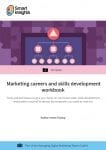Standing out from the crowd is a challenge and therefore conceiving, creating and maintaining a personal ‘brand’ gives us the opportunity to get noticed and remembered by our managers, peers and customers
For some people, the concept of ‘personal branding’ does not sit well. The idea that we are all walking, talking commodities to be packaged up and sold contradicts the notion of being independent, free and unique individuals. I believe the reality is somewhere in between.
Whilst we are absolutely independent, free and unique, within the working world we are operating in a very noisy, competitive environment. Standing out from the crowd is a challenge and therefore conceiving, creating and maintaining a personal ‘brand’ gives us the opportunity to get noticed and remembered by our managers, peers and customers.
What is a brand?
According to the American Marketing Association, a brand is “a name, term, design, symbol or any other feature that identifies one seller’s good or service as distinct from those of other sellers.”
When we consider that children as young as three can identify brands by their names and symbols, and also make judgements about products and people associated with those brands, the power of branding is clear for all to see. The world is a crowded, confusing place and a brand that is both distinctive and clearly articulates its meaning to a target audience will triumph over less memorable alternatives.
How Many Logos Can a Child Recognize? from Sovev Media on Vimeo.
If we apply the basic principles of branding to ourselves, we can begin to see the opportunities it offers us in our professional lives to stand out and connect with the people, companies, and roles in which we want to be associated.
Defining your personal brand
One of the most helpful ways to think about personal branding is to take a step back and consider:
- What do you stand for?
- What makes you different?
- What do you want people to say about you when you’re not there?
Personal branding essentially boils down to reputation management and ensuring you work on the things that you find interesting and ultimately make you happy. Being clear on what you’re ‘about’ helps you pinpoint your unique selling point and what you want to be known for amongst your wider professional community.
The process of evaluating your personal brand is a valid exercise whether you’re starting out in your career or midway through and reviewing your role. Modern marketing careers are fluid and change over time so a clearly defined personal brand can help you to transcend sectors, role, and companies.
1. Start with the end in mind
Take some time to think about where you want to be in the future. For many of us it’s difficult to know exactly where we want to end up in five or ten years’ time but it’s likely we’ll have a pretty good idea based on what we enjoy doing and things that motivate us.
Consider the main topics and areas of work that really trigger your interest. What are the common themes, topics and subjects that consistently show up in your best work? A simple assessment will give you an indication of your possible destination points and the basis to start crafting your personal brand.
Top tips:
- Start thinking about personal brand early but keep an open mind
- Take the opportunity to assess impact and what motivates you
- Remember: you’ll require an element of consistency throughout everything you do
2. Conduct a personal brand audit
Once you’ve established the initial elements of your personal brand be proactive and start asking for feedback. One-to-one meetings with your manager and 3600 feedback from peers and colleagues will help you understand if the reality matches your assumptions about yourself.
Friends and family can also provide very valuable feedback and often provide some of the most honest and surprisingly insightful observations! Take this on board with an open mind and good spirit as it’s important to build an honest picture of who you are and how others see you.
Top tips:
- Ask friends, family and colleagues to describe you in three words
- Start building up a bank of stories that link to what you enjoy and do well
- Personal branding never stops and it takes time to develop. The majority of the work will be required at the start but don’t become complacent and
3. Define your personal mission statement
Once you’ve had an opportunity to assess and refine your personal goals, ambitions and expectations, commit to paper a personal mission statement. This may seem a little kooky to some but it can be really helpful putting something in writing. It makes the process feel more tangible and will help you to focus on what really matters.
A good exercise is to describe yourself in a 140 character tweet. The word constraint will help you to zero in on the elements that sum you up and articulate your strengths, passions and interests. Similarly, consider what you would say in the classic elevator pitch. If you only had 30-60 seconds with someone else, how would you sell yourself on the way up to the top floor?
Top tips:
- Use words and language that is authentic to who you are and confidently express this to friends, colleagues and acquaintances
- See your personal brand as a decision filter, enabling you to make choose the projects, tasks and jobs that align with your interests
- On platforms such as LinkedIn and Twitter, consider defining yourself by who you are or want to be rather than your job title
